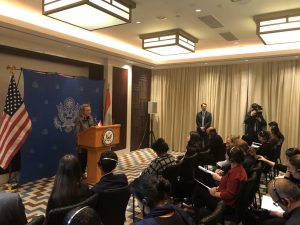U.S. Principal Deputy Assistant Secretary for South and Central Asian Affairs Alice Wells made a two-day visit to Tajikistan from January 6-7. The visit went ahead even as Secretary of State Mike Pompeo postponed his own trip to the region on account of the flaring of tensions in the Middle East. Pompeo was scheduled to visit Kazakhstan and Uzbekistan from January 5-6, in the latter to attend a meeting of the C5+1 — a gathering of the five Central Asian foreign ministers with their American counterpart.
A State Department spokesperson told The Diplomat that Wells “traveled to Tajikistan to meet with government officials and visit our U.S. government programs that strengthen Tajikistan’s security, economic development, and regional connectivity.”
Wells’ trip included meetings with the Tajik ministers of foreign affairs, defense, state security, and internal affairs, as well as a visit to a border guard post in Panj, on the Afghan border. Wells also met with Tajik civil society representatives and spoke to local media. She sat for an interview with the U.S.-funded RFE/RL’s Tajik Service, known locally as Radio Ozodi.
Security issues continue to form the core of U.S. engagement with Tajikistan, with the strong endorsement of regional cooperation close behind.
Wells told Radio Ozodi that the United States has been and continues to be strongly committed to Tajikistan’s security. She noted that Washington has provided “more than $200 million in border security assistance.”
The State Department spokesperson emphasized security cooperation in comments to The Diplomat. “As part of our commitment to Tajikistan’s independence, sovereignty, and territorial integrity, we are deepening our security cooperation in the areas of border security, counterterrorism, law enforcement, and joint military exercises and training.”
In a pair of tweets, signed by Wells using her initials of AGW, the senior diplomat discussed her visit to Panj:
While visiting Panj–a town on the border of #Tajikistan & #Afghanistan–I noted the security challenges and economic opportunities these neighbors share. The US is proud to support cooperation between, Tajikistan, Afghanistan, and the broader region…Thanks to #Tajikistan for its commitment to border security & efforts to prevent flow of terrorism & narcotics. With over 10 yrs of @DeptofDefense support & $200 million in US security assistance, Tajikistan is building capacity to counter these shared threats. AGW.
Despite U.S. assistance — as well as Chinese and Russian assistance — Tajikistan continues to face border troubles.
In November 2019, a border post on the Tajik-Uzbek border was attacked. The Tajik government spun a wild narrative in which 20 members of the Islamic State crossed the Tajik-Afghan border and three days later assaulted the small border post. As Bruce Pannier wrote recently in his review of 2019 in the region:
Tajik officials say militants from the extremist Islamic State (IS) terrorist group crossed from Afghanistan’s Kunduz Province into Tajikistan specifically to carry out acts of terror. IS later claimed responsibility for the attack that left at least one Tajik policeman and border guard dead (though later reports claimed at least five more border guards were killed) as well as 15 of the 20 attackers.
Information that subsequently emerged, such as the fact that women and children had participated in the attack, cast much doubt on an IS link.
But for the many parties who see militants behind practically every rock on the Afghan side of the border, the Tajik government’s version of events just proved what they have been warning about. And in the case of Russia and China, this meant offering or forcing their help on Central Asia wherever possible.
In her interview with Radio Ozodi, Wells reiterated the common U.S.refrain that Washington would not let Afghanistan be used as a base for terrorism in the region or the wider world. As the Trump administration seeks an exit from Afghanistan, the states of Central Asia are watching carefully, as a U.S. withdrawal has potential security implications for the region.
The United States has also strongly reiterated its interest in bolstering regional cooperation. Although Pompeo’s planned C5+1 meeting was scrapped, Wells spoke strongly of the opportunity in the region for enhanced neighborhood cooperation.
“I think there is a tremendous potential for C5 cooperation both within Central Asian countries but also with the United States and with the neighborhood,” Wells said, pegging the opening of the regional door for cooperation to the rise to power of Uzbekistan’s President Shavkat Mirziyoyev.
Wells also briefly discussed media freedom with Radio Ozodi, which has faced difficulties in renewing the accreditation of some of its employees and last year confronted a scandal regarding its coverage of the government.
“Principal Deputy Assistant Secretary Wells’ trip was used as an opportunity to raise the United States’ concerns with restrictions on fundamental freedoms in Tajikistan, including freedom of the press,” a State Department spokesperson told The Diplomat.
The spokesperson commented that “Particularly during a year with parliamentary and presidential elections, it is important that the Tajik people have access to independent media outlets such as Asia-Plus, Akhbor, and Radio Ozodi, and that those outlets can report freely and critically. “
Wells made similar comments in her Radio Ozodi interview. These comments are arguably aspirational, given the Tajik state’s continued crackdowns on independent media.
No election in Tajikistan has been judged free and fair. Tajik President Emomali Rahmon is in his 27th year at the helm in Dushanbe, making him the longest serving leader in the post-Soviet space (if we no longer count Kazakhstan’s retired-but-still-powerful First President Nursultan Nazarbayev, that is).

































